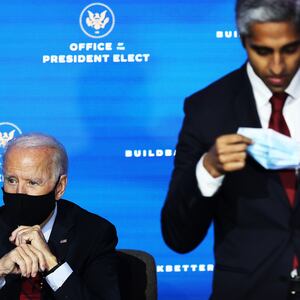Joe Biden’s presidency may be a lot of things, but a restorer of norms and institutions it is not.
Take, for example, Biden’s willingness to embrace the kind of Orwellian language that justifies spending unprecedented amounts of money simply by deeming things to be “infrastructure”—or his misrepresenting the Georgia voter law and referring to it as “Jim Crow.” In a recent Washington Post opinion piece, Gabriel Sterling, the Georgia elections official who heroically stood up to Donald Trump, pleaded with Biden to tone down his rhetoric, writing, “Someone is going to get hurt. Your words matter. The facts matter.”
Biden’s rhetoric is not normal, or fine, but he’s had space to do this as many Americans understandably applaud a president whose speeches don’t end with supporters scaling the walls of the Capitol and beating cops with American flags. But while it is necessary to the maintenance of our democracy to have a president who does not attempt to overturn an election, it is far from sufficient.
ADVERTISEMENT
Biden’s penchant for redefining words also comes at a time that his party is pushing court-packing, adding new states, and nuking the filibuster.
To fully understand why this is problematic, I revisited How Democracies Die, by Harvard professors Steven Levitsky and Daniel Ziblatt. The book was published while Trump was president, and it was easy to read the book through the prism of his authoritarian tendencies. However, re-reading the book and listening to the author interviews in the context of Biden’s presidency raises different concerns.
Levitsky and Ziblatt focus on two important norms that are “fundamental to a functioning democracy.” The first is mutual toleration, which involves viewing the other side as legitimate and equally as patriotic as you. In today’s political climate, neither party consistently does this, though Biden at least tries to tamp down his rhetoric. One manifestation of the decline of mutual toleration has been the notion that every election is of existential importance. We saw this in 2016 in the form of the “Flight 93” election, and Biden essentially mirrored that, insisting that this was the “most important election of our lifetimes.”
The second norm is forbearance, which the authors define as “restraint in the exercise of power.” Here’s where Biden is failing magnificently.
“Think about what the president can do under the Constitution,” Levisky told NPR’s Fresh Air in 2018. “The president can pack the Supreme Court. If the president has a majority in Congress—which many presidents do—and the president doesn't like the makeup of the Supreme Court, he could pass a law expanding the court to 11 or 13 and fill [it] with allies—again, he needs a legislative majority—but can do it. FDR tried.”
Pack the Supreme Court? Who would want to try that sort of obvious power grab again? Oh yeah. Biden just launched a commission to investigate that, and four Democrats reportedly plan to introduce legislation to add four Supreme Court seats, which would give Democrats a 7-6 majority. And speaking of Orwellian language, the other day Rep. Jerry Nadler had the audacity to call this idea “unpacking” the court.
A thorough review of How Democracies Die also serves as a reminder that these two fundamental norms began breaking down before Trump, and likely contributed to his election. In terms of the lack of forbearance, the escalation went something like this: Harry Reid ended the filibuster for non-Supreme Court judicial confirmations to circumvent Republican obstructionism, which opened the door for Mitch McConnell to end the filibuster for the Supreme Court, and led to today’s Democrats wanting to completely nuke the legislative filibuster.
Another example was President Obama’s spate of unilateral executive orders, which he rationalized by saying, “We can’t wait for an increasingly dysfunctional Congress to do its job.” (Democrats can, of course, point to the GOP’s failure to act on Merrick Garland’s nomination to the Supreme Court to demonstrate that the tit-for-tat was bipartisan.)
In this regard, the Biden era represents a return to normalcy. The problem is that the “normal” of recent decades has involved the erosion of previously fundamental norms.
Biden’s defenders might say that he’s simply doing what he has to do to appease his base without actually smashing norms. He didn’t appoint people truly committed to court-packing schemes on his blue-ribbon commission, and Nancy Pelosi says she has no intention of bringing this latest court-packing bill to the floor. And while Biden is paying lip service to talking filibuster, he hasn’t exactly been leaning into it—and with Senators Joe Manchin and Krysten Sinema squarely opposed, he couldn’t get it done even if he did mean it.
But ideas have consequences. And by entertaining these ideas, Biden is creating a sort of permission structure for Democrats to revisit them—and he’s opening the door for Republicans to escalate fearmongering by saying that “they wanted to do it to us—and when they get a chance, they will!” And the truth is, that’s not just wild talk. Keep in mind, it’s not just the left-wing fringe that is floating these ideas. Barack Obama has called for eliminating the legislative filibuster (“a Jim Crow relic”) and then making D.C. and Puerto Rico states to presumably add four new Democratic senators. If Democrats had a four-senator advantage now, rather than an even tie when the party holds together plus Vice President Kamala Harris’ vote to break ties, all bets would be off.
Rather than squashing this spiral and leading us to a better place, Biden has merely reverted to a kinder, gentler brand of norm-busting politics. What we actually need is a president willing to be the opposite of Trump—not just stylistically, but in terms of de-escalating tension between the parties. The problem is that doing this would require taking your foot off the gas and refusing to run up the score when you can—a tough thing to do if you’re angling to be the next FDR or LBJ.
But this cycle of escalation will not end on its own. If Biden won’t do that work, it won’t be long before the next Trump arrives and hastens the death of our damaged democracy.







